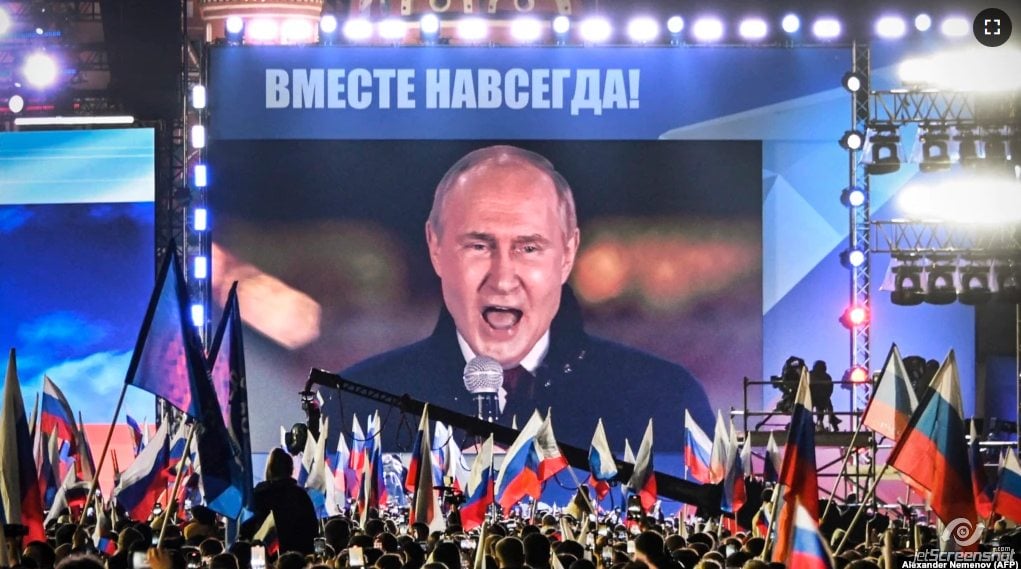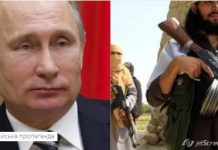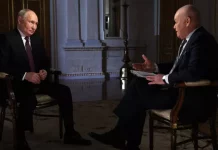By Kseniya Kirillova, for Jamestown Foundation
After the humiliating surrender of Kherson, Russian troops have produced no lasting military victories on the battlefield. Even the devastating missile strikes on Ukraine’s energy infrastructure are not producing the desired effects. Meanwhile, contrary to some experts’ expectations, Russian losses have neither led to a tangible increase in anti-war sentiment in Russia, nor to a revolt of radical patriots against President Vladimir Putin—at least for now.
In truth, this can be explained by the stubborn, apolitical conformist nature of the majority of Russians who support the war. Even the pro-Kremlin Telegram channels admit that “Russian society does not accept intense politicization, and most Russians try to maintain their usual format of apoliticism” (T.me/russica2, November 21). As for the “ideologically charged” radical patriotic minority, the Kremlin’s propaganda seems to be succeeding in changing the key approach to war. If victory in the war against Ukraine had been perceived as the highest goal, now, with the formal preservation of the previous postulates, this occupies an increasingly secondary role and is presented more as a means of solving Russia’s internal problems.
For example, over the past few months, one of the main theses of Russian war propaganda at all levels has been the assertion that, to achieve victory, a radical restructuring of the country is necessary. This includes putting the economy on a war footing, creating a new “ideology of victory” and “cleansing [the country] from traitors” (Life.ru, November 22). However, lately, it has become more common to see the goal and the means being interchanged, and propagandists have openly begun to declare that the war is beneficial to Russia, first and foremost, for solving domestic problems.
During one of Russia’s main propaganda show, “Evening With Vladimir Solovyov,” we now hear that the war is rebuilding the economy and helping fight “lies and double standards.” Indeed, it is becoming the only possible impetus for achieving the desired changes within Russia (YouTube, October 2). Other propagandists express themselves similarly, noting that the war, having created a global conflict with the West, has made using offshore means for hiding money stolen from the economy impossible (Eadaily.com, August 1). Religious propagandists add that the readiness to kill and to die is the true essence of the “holy” Russian people, and therefore, they must shed blood to become themselves once again (YouTube, October 2).
Recently, the narrative that the war is a means of purifying society has become so basic that even Putin himself has repeated it. At a meeting with the “mothers of the mobilized” (most of whom were, in reality, government officials), he bluntly stated that “today’s events are the path to purification” (Meduza, November 25).
On the one hand, claims that Russia is killing tens of thousands of innocent people purely to solve its internal problems reveals an incredible level of cynicism. Yet, on the other, these narratives allow the majority of Russian society to concentrate more on the “cleansing process” and pay less attention to what is actually happening at the front. It is no coincidence that, against this backdrop, Russian propagandists have begun to publish statements that Kherson, and even Crimea, cannot be considered “Russian territory” (YouTube, November 24).
Several aspects of this “purification” stand out, which meet the deepest expectations of the majority of Russian society. First, the process promotes a sense of unity and solidarity among active supporters of the war, expressed in the growth of the volunteer movement. At the federal level, inter-regional volunteer organizations are springing up in greater numbers (Tgstat.ru, November 25). At the grassroots level, critical medical and hygienic items are being collected for the Russian military (Eanews.ru, September 28).
In many Russian regions, volunteer groups are being created to aid newly mobilized units through, among other activities, sewing warm mittens, balaclavas and other winter clothes (Momenty.org, September 28). In truth, few people are involved in such movements, and often local authorities have to force students, or even schoolchildren, to sew clothes for the mobilized (Nashgorod.ru, October 15). However, in the eyes of radical patriots, the illusion of “national unity in the face of a holy war” has been effectively established.
Second, Russian officials are being forced to actively participate in the war effort. Governors, mayors and regional administrative heads have no choice but to visit the occupied regions more frequently. The city manager of Chita, Alexander Sapozhnikov, even announced that he would go to war because he “cannot stand aside” (Svoboda, November 21).
All this creates an illusion of a growing rapprochement between the Russian authorities and the general population. Meanwhile, a new formation of the “people’s leaders” stand ready to go to the front. The demand for such leaders among the Russian people, tired of unjust and corrupt officials, has existed for many years. In fact, according to pro-Kremlin sociologists, Wagner Group Founder Yevgeny Prigozhin’s rise in popularity is directly due to his ability to “reflect, as much as possible, the essence of the aspirations and worldview of the Russian people” (Tgstat.ru, November 25).
Third in this “cleansing process” is the increase in payments and social benefits to the mobilized and their families (Kp.ru, November 2). So far, the Russian people have yet to feel the gap in well-being between those who go to the war and those who stay home. In this regard, increased social support for the Russian army appears to be a form of social justice and an example of Moscow’s true concern for its people.
The fourth aspect of this “purification” of Russian society, which satisfies the radical patriotic minority, is the creation of a state ideology. Russian officials, propagandists and scholars have mused about the need for a new patriotic ideology, one that reflects the long-standing desires of these more radical elements (Newizv.ru, September 26). Moreover, despite the fact that such an ideology has yet to be clearly formulated, Russian universities are already preparing a framework for studying and establishing such a centralized philosophy.
According to some outlets, the development of such a course is being overseen by the Kremlin’s internal political bloc, led by Russian Presidential Administration head, Sergey Kiriyenko. The postulates of this study will fall neatly in line with the conservative ideology to which Putin is partial (Meduza, October 25). Furthermore, a “patriotic conservative movement” may be created to institutionalize this approach, and, as leaked to the press, it would be headed by Prigozhin (Meduza, November 15).
Finally, the illusion of cleansing Russian society will be maintained by increased repressions against the “traitors and saboteurs” in power (see EDM, November 14). This would not only explain the ongoing military setbacks in Ukraine but could also create a sense of transformation within the country.
In reality, Putin’s system—based on lies, corruption and violence—is not capable of qualitative transformations. Ultimately, the war against Ukraine does not solve Russia’s problems, it exacerbates them (see EDM, October 12). All these changes are taking place at a grassroots level, and some are rather illusory. However, this “cleansing” narrative, to some degree, has successfully managed to divert the Russian population’s attention away from the situation at the front and has pushed the Russian people to support the war as a necessary condition for the “purification” of society.
By Kseniya Kirillova, for Jamestown Foundation





